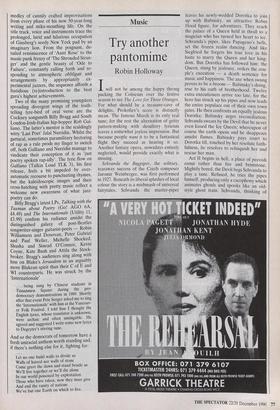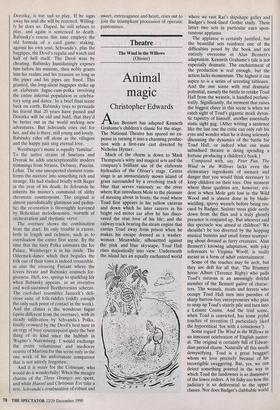Music
Try another pantomime
Robin Holloway
Iwill not be among the happy throng packing the Coliseum over the festive season to see The Love for Three Oranges. For what should be a treasure-cave of delights, Prokofiev's score is distinctly mean. The famous March is its only real tune; for the rest the alternation of gritty pattern-making with desultory lyricism leaves a somewhat joyless impression. But because people want it to be a fantastical flight they succeed in hearing it so. Another fantasy opera, nowadays entirely neglected, would provide exactly what is missing.
Schvanda the Bagpiper, the solitary, tearaway success of the Czech composer Jaromir Weinberger, was first performed in 1927. Beneath its liberal splashes of local colour the story is a mishmash of universal fairytales. Schvanda the master-piper
leaves his newly-wedded Dorotka to join up with Babinsky, an attractive Robin Hood figure, for adventures. They reach the palace of a Queen held in thrall to a magician who has turned her heart to ice. Schvanda's pipes, likes Papageno's bells, set the frozen realm dancing. And like Siegfried he forgets his true love in his haste to marry the Queen and her king- dom. But Dorotka has followed him; the Queen, stung by jealousy, orders the cou- ple's execution — a death sentence for music and happiness. The axe when swung proves to be a broom — Babinsky's doing, true to his oath of brotherhood. Twelve extra executioners arrive too late, for the hero has struck up his pipes and now leads the entire populace out of their own town gates. He then confronts an equally jealous Dorotka; Babinsky urges reconciliation; Schvanda swears by the Devil that he never even kissed the Ice Queen; whereupon of course the earth opens and he disappears amidst flames. Babinsky pays court to Dorotka till, touched by her resolute faith- fulness, he resolves to relinquish her and rescue her man.
Act II begins in hell, a place of peevish ennui rather than fire and brimstone. Mightily bored, the Devil begs Schvanda to play a tune. Refused, he tries the pipes himself, producing only a cacophony which ' animates ghouls and spooks like an old- style ghost train. Schvanda, thinking of Dorotka, is too sad to play. If he signs away his soul she will be restored. Willing- ly he does so. Duped, he still refuses to play, and again is sentenced to death. Babinsky's rescue this time employs the old formula of a card game: staking, against his own soul, Schvanda's, plus the bagpipes, the Devil's regalia and watch and half of hell itself. The Devil wins by cheating. Babinsky humiliatingly exposes him before his minions, then nobly grants him his realms and his treasure so long as the piper and his pipes are freed. This granted, the long-silent bagpipes strike up an elaborate fugue-cum-polka involving the entire infernal population in celebra- tory song and dance. In a brief final scene back on earth, Babinsky tries to persuade his friend that 20 years have passed and Dorotka will be old and bald, that they'd be better out in the world seeking new adventures. But Schvanda cries out for her, and she is there, still young and lovely. Babinsky rides off alone as the villagers and the happy pair sing eternal love.
Weinberger's music is equally 'familiar'. To the native strains of Smetana and Dvorak he adds unexceptionable modern trimmings from Strauss, Debussy, Puccini, Lehar. The one unexpected element trans- forms the mixture into something rich and strange. He had studied briefly with Reger in the year of his death. In Schvanda he inherits his master's command of slithy chromatic counterpoint. The original is almost parodistically glutinous and pedan- tic; the re-creation is thoroughly leavened by Bohemian melodiousness, warmth of orchestration and rhythmic verve.
The overture shows the combination from the start. Its only trouble is excess, both in length and richness, such as to overshadow the entire first scene. By the time that the lusty Polka animates the Ice Palace, Weinberger is in his stride. The Odzemek-dance which then beguiles the folk out of their town is indeed irresistible, as also the ensuring Furiant where the lovers berate and Babinsky counsels for- giveness. Hell, too, springs to sparkling life when Babinsky appears, in an inventive and well-sustained Beethovenian scherzo. The card-duel resembles Janacek's deli- cious suite of folk-riddles (oddly enough the only such point of contact in the work). And the climax is the wondrous fugue (quite different from the overture), with its steady infiltration by Schvanda's Polka, finally crowned by the Devil's best tune in an orgy of busy counterpoint quite the best thing of its kind since the hubbub in Wagner's Nuremberg. I would exchange the entire voluminous and mediocre oeuvre of Martinu for this scene only in the one work of his unfortunate compatriot that is not utterly forgotten.
And it is made for the Coliseum, who would do it wonderfully! When the meagre charms of the Three Oranges are spent, and while Hansel and Christmas Eve take a rest, Schvanda's combination of robust and sweet, extravagance and heart, cries out to join the triumphant procession of operatic pantomines.



































































































 Previous page
Previous page